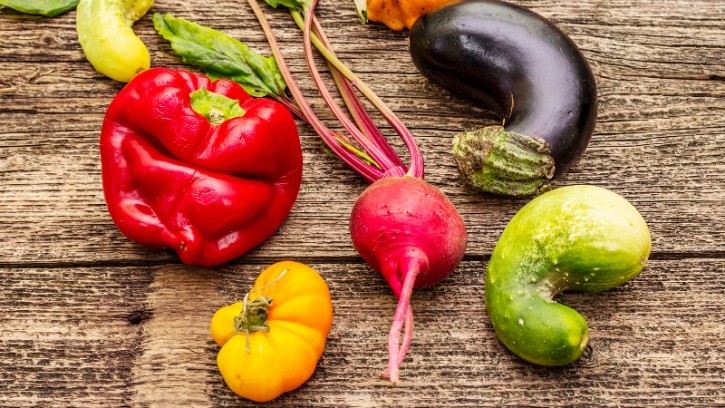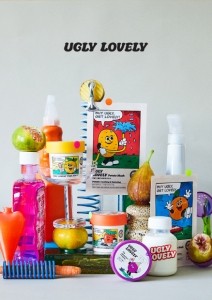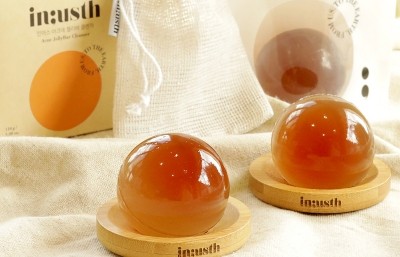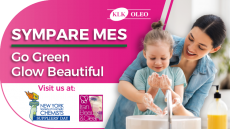UGLY move: LG H&H rides upcycling trend with launch of new conscious beauty brand

The South Korean conglomerate joins the rising number of companies that are using waste materials from the food industry to make cosmetic ingredients.
With Asia being named by industry players as one of the fastest-growing markets for natural beauty, LG H&H looks to claim a slice in the market through UGLY LOVELY.
“Beyond expansion of sales channels, competitive prices and unique packaging, the concept of conscious beauty has become popular among consumers. As such, LG H&H paid attention to the hidden value of discarded agricultural produce or by-products to launch UGLY LOVELY, which exudes a cheerful and witty vibe.
“The brand focuses on telling the story of ugly crops being regenerated into raw materials for beauty products. We plan to expand our product line to include more skin care products, as well as lip care and hand care, with the aim of developing the brand into one that reflects the preferences and values of our customers,” the firm said.
'Ugly' crops are crops that have blemishes or are slightly distorted in shape, making them less marketable, but that retain their taste and nutrition.
UGLY LOVELY’s line-up consists of five products, namely two types of wash-off mask packs, two variations of sheet masks, and one sleeping pack.
All products are said to be formulated with ingredients boasting a natural origin index of 90% and above, based on ISO16128 standards, and certified vegan by Korea Vegan Certification Institute.
The brand takes into account sustainability from ingredients to containers and packaging materials, including the box packaging that is created from 100% recycled paper.
Furthermore, the mask pack uses 100% waste plastic pyrolysis oil as a raw material for its container, cap and spatula, while the sheet mask is an upcycled coated sheet made using sugarcane and packed in a pouch made of 48% recycled plastic.
Its hero product, Fig Mask, is a sugar scrub containing extracts from pesticide-free ugly figs grown in South Jeolla Province, and ground food by-products such as walnut shells and apricot seeds.
The soft balm paste texture is reminiscent of fig spread and provides moisturising care while the sugar scrub granules remove dead skin cells in gentle manner. It claims to be void of additives, including synthetic fragrances, and has undergone skin irritation test.
For the Yuja Mask, the yuzu extracts used are sourced from Goheung county in South Jeolla Province, which accounts for about 40% of the country’s citron production.
Formulated with ingredients such as vitamin C and niacinamide, the wash-off mask is characterised by a fresh citrus scent and a subtle warming sensation “as if it were a steam towel”.
As part of the launch, a one-week pop-up store was held at a beauty select store in The Hyundai Seoul shopping mall in November to raise consumer awareness of upcycling and offer special event promotions.
UGLY LOVELY products are available at the brand’s official online shop on Naver.
Worldwide phenomenon
Elsewhere across the globe, companies are upping their game in terms of creating new cosmetic ingredients from natural or upcycled resources.
For instance, US firm Carbonwave is making emulsifiers from seaweed sargassum to help formulators develop sun care products that are “effective and sensorially beautiful”.
According to the firm, its broad-spectrum SeaBalance 2000 has been gaining traction in Asia as a natural alternative due to its compatibility with various ultraviolet filters, such as titanium dioxide and zinc oxide. It also claims to be able to produce “sophisticated textures” to meet Asian consumers’ high sensorial expectations.
A producer of powders made from nut shells and the pits of stone fruits, BioPowder believes upcycled plant-based powders can help replace microplastics across multiple categories.
The company started in 2017 with olive stone powder and has since expanded to others, including argan shell and avocado stone powder, which are suited for myriad cosmetics applications.
At the same time, Symrise has touted upcycling as the next trend in fragrances. Its Garden Lab collection of fragrances are derived from upcycled vegetable by-products, such as artichoke, leek, and onion.
Symrise’s proprietary SymTRAP extraction technology has made it possible to develop fragrance ingredients from food and fruit by-products. Previously, fruity fragrances had to be created synthetically, as their scents typically cannot be extracted.
The firm said that these innovations resonate with major consumer trends in Asia-Pacific, an important and rapidly growing fragrance market. Already, niche fragrance brand L’Artisan Parfumer has a range of perfumes with vegetable notes under its Le Potager collection.


![CJ Olive Young has collaborated with IBK to establish a KRW100bn fund to support beauty SMEs. [Olive Young]](/var/wrbm_gb_food_pharma/storage/images/_aliases/wrbm_medium/publications/cosmetics/cosmeticsdesign-asia.com/headlines/business-financial/cj-olive-young-establishes-74m-fund-to-support-k-beauty-smes/17095625-1-eng-GB/CJ-Olive-Young-establishes-74m-fund-to-support-K-beauty-SMEs.png)
![KIGAM has discovered skin care benefits of marine mud gathered from the Hupo Basin in the East Sea. [Getty Images]](/var/wrbm_gb_food_pharma/storage/images/_aliases/wrbm_medium/publications/cosmetics/cosmeticsdesign-asia.com/article/2024/02/01/korean-institute-unearths-cosmetic-potential-in-10-000-year-old-marine-mud/17040806-3-eng-GB/Korean-institute-unearths-cosmetic-potential-in-10-000-year-old-marine-mud.jpg)
![Hi-Q Marine Biotech studying its fucoidan-polysaccharide to expand its potential in the cosmetics market. [Getty Images]](/var/wrbm_gb_food_pharma/storage/images/_aliases/wrbm_medium/publications/cosmetics/cosmeticsdesign-asia.com/headlines/formulation-science/hi-q-ramping-up-r-d-efforts-to-push-the-potential-of-fucoidan/17063240-1-eng-GB/Hi-Q-ramping-up-R-D-efforts-to-push-the-potential-of-fucoidan.jpg)





![Indus Valley is working to corner 30% of India's online premium boxed hair colour market. [Indus Valley]](/var/wrbm_gb_food_pharma/storage/images/_aliases/wrbm_tiny/publications/cosmetics/cosmeticsdesign-asia.com/article/2024/07/26/indus-valley-aims-to-secure-30-of-india-s-online-premium-hair-colour-market-with-organic-offerings/17594932-5-eng-GB/Indus-Valley-aims-to-secure-30-of-India-s-online-premium-hair-colour-market-with-organic-offerings.jpg)
![[Getty Images]](/var/wrbm_gb_food_pharma/storage/images/_aliases/wrbm_tiny/publications/cosmetics/cosmeticsdesign-asia.com/china/china-focus-latest-developments-in-china-s-booming-beauty-market25/17606695-1-eng-GB/China-focus-Latest-developments-in-China-s-booming-beauty-market.jpg)
![Kosé has launched makeup brand Visée in Singapore as part of plans to reinforce its position in SEA. [Visée]](/var/wrbm_gb_food_pharma/storage/images/_aliases/wrbm_tiny/publications/cosmetics/cosmeticsdesign-asia.com/headlines/business-financial/visee-singapore-kose-aims-to-enhance-brand-visibility-in-sea-with-new-launch/17587264-1-eng-GB/Visee-Singapore-Kose-aims-to-enhance-brand-visibility-in-SEA-with-new-launch.jpg)
![ble C&C is set on reinforcing its competitiveness in China’s beauty market. [Missha]](/var/wrbm_gb_food_pharma/storage/images/_aliases/wrbm_tiny/publications/cosmetics/cosmeticsdesign-asia.com/headlines/business-financial/able-c-c-aims-to-strengthen-competitiveness-in-china-through-online-expansion-kol-collabs/17591626-1-eng-GB/Able-C-C-aims-to-strengthen-competitiveness-in-China-through-online-expansion-KOL-collabs.jpg)

![LG H&H genetic study says 23 genetic regions affect natural skin tone. [Getty Images]](/var/wrbm_gb_food_pharma/storage/images/_aliases/wrbm_tiny/publications/cosmetics/cosmeticsdesign-asia.com/article/2024/07/23/lg-h-h-discovery-of-genetic-skin-tone-factors-in-east-asians-potentially-key-to-skin-radiance-developments/17587210-1-eng-GB/LG-H-H-discovery-of-genetic-skin-tone-factors-in-East-Asians-potentially-key-to-skin-radiance-developments.jpg)

![DR.CI:LABO expects brand-supplier partnerships gain more public prominence as consumers interest in skin care grows online. [Dr.Ci:Labo]](/var/wrbm_gb_food_pharma/storage/images/_aliases/wrbm_tiny/publications/cosmetics/cosmeticsdesign-asia.com/article/2024/07/22/brand-supplier-partnerships-will-come-to-the-fore-amid-the-online-skin-care-landscape-dr.ci-labo/17576755-1-eng-GB/Brand-supplier-partnerships-will-come-to-the-fore-amid-the-online-skin-care-landscape-DR.CI-LABO.png)


